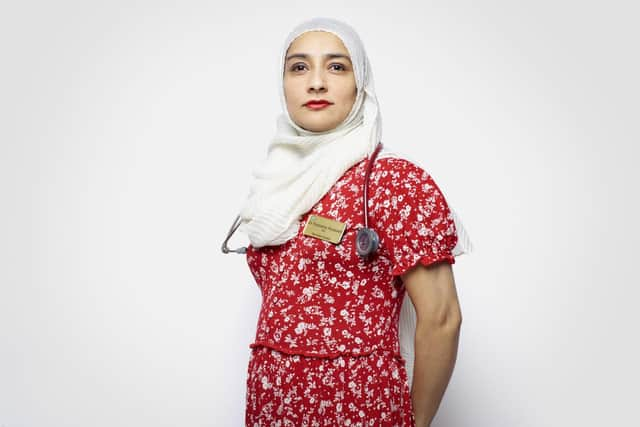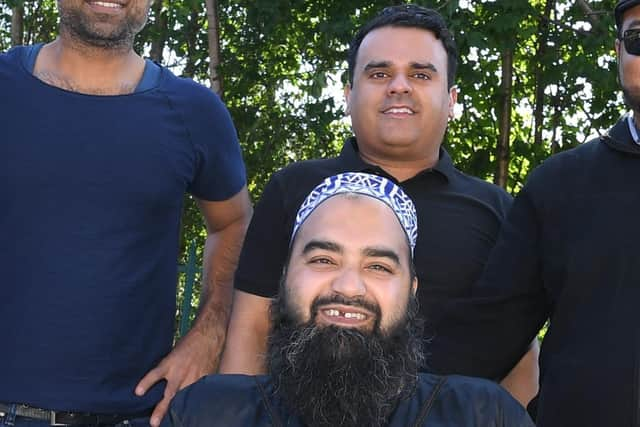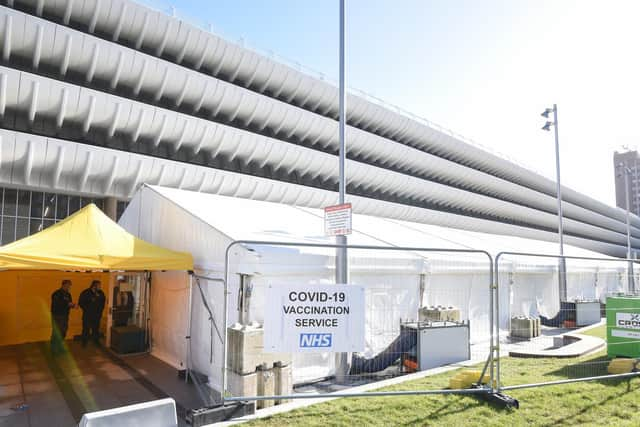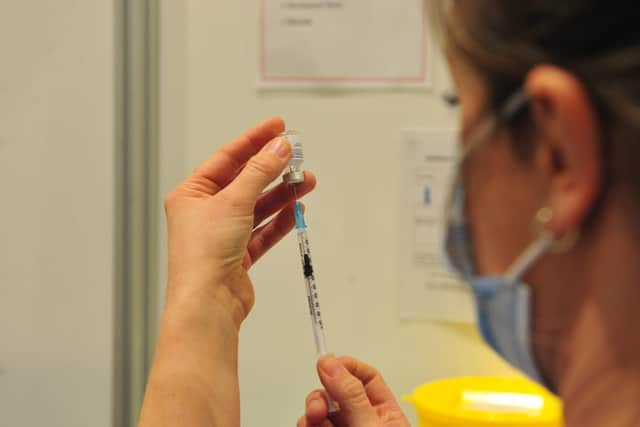What's really happening with Covid in Lancashire's minority communities?
and live on Freeview channel 276
“It’s a big problem in the BAME (Black, Asian and Minority Ethnic) community”, says Preston-raised GP of the year, Dr Farzana Hussain.
“Black Africans/Caribbeans have the lowest uptake, followed by South Asians, especially Bangladeshi and Pakistani.”
Advertisement
Hide AdAdvertisement
Hide AdWhile NHS bosses say there is currently no statistical evidence to support a reduced uptake in BAME communities, anecdotal evidence from workers on the front line and from grassroots community groups tell another story.


Infact a survey by the Royal College of GPs last month showed that people of mixed ethnicity, Asian and black are, respectively, approximately only 33, 47 and 64 per cent as likely to receive the vaccine as white people.
Dr Farzana - who has taken to telephoning people who have not yet taken up their invitation for the vaccine - believes there is hesitancy rather than outright rejection of the vaccine, and believes the key to breaking down barriers is to “listen, not just tell”.
This ‘listen’ message has been echoed by the members of Preston’s Black British community and also Deepdale Community Association (DCA), who point to mistrust and a lack of a meaningful relationship with authorities as a being a significant barrier.
Advertisement
Hide AdAdvertisement
Hide AdIrfan Sabir, chairman of the DCA has lost six neighbours in the Burrow Road area of Deepdale due to coronavirus.


He says the Counties area -an area off Deepdale Road where roads are named after counties - has been disproportionately affected by deaths.
He said: “We have spoken for years about how the Counties area has been a ‘forgotten’ area in terms of authorities, and how there is inequality in Deepdale, and now it’s showing in our health.
“A lot of us have lost neighbours to Covid - I have lost six neighbours in close proximity - and it’s traumatic for our community.”
Advertisement
Hide AdAdvertisement
Hide AdHe added: “There has never been engagement with us, and any relationship takes time. So there is very little to build on when people are being asked to take this new vaccine. The opportunity to ask questions has unfortunately not been there.


“I actually think that most people do want to take the vaccine, but lots of people do have questions about it. But there is confusion over questions and refusal to take it.”
Adrian Murrell, director of Preston’s Windrush Initiatives group which works with Preston’s black and mixed-race community, said: “There has always been mistrust in our community because nobody has ever looked out for us, even though we’ve integrated more than anyone else.
“As a group we’re trying to convince people that it’s safe, but there is a lot of misinformation.
Advertisement
Hide AdAdvertisement
Hide Ad“There is a lot of anxiety about the vaccine, but we are worried about Covid. A lot of our elders have passed away, and many people in their mid-50s recently.”


Kamran Ahmed, vice chairman of the DCA, is concerned about how the BAME community are being portrayed over the concerns.
He said: “People might be thinking that we’re getting in the way of everyone getting out of lockdown. But we just have questions, not big conspiracies.
“It’s horrendous how much misinformation is out there.
“I have not heard of anyone out-and-out refusing the vaccine, but there are a lot of scared people with questions. People want to know what’s inside it, so clearly that tells you that information is not getting through.
Advertisement
Hide AdAdvertisement
Hide Ad“And it’s not just in the Asian communities, it’s the Kurdish and the Romanian population too.”
Dr Hussain, a former Preston College student, said: “One older lady I spoke to was worried about long-term side effects, but after talking it through with her, and with the support of her son, and desire to see her six-year-old grandchild grow up, she changed her mind.”


Dr Hussain believes that working with families is key and that mothers can have a huge role to play due to their influence across the family – especially in multi-generational households.
But one harmful piece of misinformation spreading through these communities, and that has a particular impact on women, is around infertility.
Advertisement
Hide AdAdvertisement
Hide Ad“This disinformation comes from a real sense of shame that not being able to bear children brings and is a particular issue among women from African and Asian backgrounds.
“They would refuse the vaccine if there was a one per cent chance of that happening, but I want to reassure people that there is no evidence of this at all.
“This is why it’s so important that people come and talk to me or other trusted healthcare professionals to make sure they have accurate information and are not putting themselves and their loved ones at risk.”
Others have raised concerns on religious grounds, such as an uncertainty around whether it would break fasting during Ramadan.
Advertisement
Hide AdAdvertisement
Hide AdDr Hussain, who is a practising Muslim, says: “Getting an injection does not break the fast – it’s not nutrition. There is absolutely no reason why you shouldn’t have it. The Koran says saving your life is the most important thing, to save one life is to save the whole of humanity. It’s a responsibility of a practising Muslim to take their vaccine.”
As well as misinformation, Kamran points to poverty, poor nutirion, overcrowded houses - sometimes two families are living in one terraced house, lack of access to garden space, and pollution in the area as reasons for the high numbers of deaths in his community.
He counted nine in the Counties area in the past few weeks.
He said: “The disused railway line behind Burrow Road should be a nice green space, but it’s used as a dump and you get big rats from there. People are scared to open their doors for fresh air incase the rats come in.”
He points to a problem accessing GPs (“receptionists act as gatekeepers and you can’t get passed them”), and also the feeling that you shouldn’t over burden them at the moment, and a “deprivation of information”.
Advertisement
Hide AdAdvertisement
Hide AdHe said: “You need to give it in all different languages, not just for the Asian population, but for all. And don’t just post it - go and have a conversation, you can do that in a socially-distanced way.”
Nigerian-born Dr Perpetua Emeagi, lecturer in Human Biology and Biological Sciences at Liverpool Hope University, agrees that there is a problem of dissemination of information.
She says while there is detailed information on the individual vaccine developers’ websites, such as Pfizer and AstraZeneca, it’s still not getting to the people who need to hear it.
She said she often hears concerns that the vaccine has been rushed and people are being used as ‘human guinea pigs’.
Advertisement
Hide AdAdvertisement
Hide AdShe said: “I can only do so much to convince people. I’ve spoken with extremely sceptical people who actually work in the healthcare profession while others have even accused me of taking payment to spread propaganda! That’s the level of suspicion we’re talking about.
“But what the Government needs to do at this point is to run a serious, dedicated programme of presentations explaining how the vaccine is produced from start to finish - from application, to emergency vaccine production, to clinical trials, to rolling it out, and what the outcomes are in individuals who’ve already received it.
“I’m talking about websites, TV, radio and social media. It might sway a lot of people into receiving the vaccine at a time when we need as much uptake as possible.
“Because at the moment there’s something of a vacuum where people’s questions are being lost.
Advertisement
Hide AdAdvertisement
Hide Ad“People simply don’t understand it, and I feel if there was more awareness about the technology then people would be more inclined to get vaccinated.”
While groups spoken to by the Post say most people are being sensible, and pro-active work is taking place, including a Youtube videos and a number of webinars with health professionals, still people’s thoughts are being skewed by the trauma of death.
Kamran said: “People are saying things like ‘Don’t go into hospital, you won’t come out’, and it’s not because of a lack of education or being closed-minded, people are traumatised. Death is everywhere, it’s destroying people inside”.
Irfan added: “It’s been devastating for our community because we’re very close - we’ve had to be because for years we’ve had to fight to be heard.
Advertisement
Hide AdAdvertisement
Hide Ad“But now we’ve been physically separated and families have had to be left alone to grieve. There is a heightened sense of isolation in communities that are used to being close, and mental health is deteriorating for a lot of people.”
To improve matters, the DCA are calling for grassroots groups such as their own to take a seat at the top table with decision makers, to inform them of what ordinary people think.
Health professionals are urging people to speak to their GPs about any concerns.
Speaking to the people of her home city, Dr Hussain said: “My message would be ‘don’t be afraid to ask the questions, thats what your GP practice and pharmacists are here for’ - make an informed decision - know facts not fiction.”
What does the NHS say?:
Advertisement
Hide AdAdvertisement
Hide AdNHS Midlands and Lancashire Commissioning Support Unit (CSU), which is leading on the vaccine rollout, says it is working with local authorities, community organisations and representatives from our communities to gain insight and data to highlight any potential barriers and perceptions that could affect the uptake of the Covid-19 vaccination in Lancashire and South Cumbria.
It is also taking targeted action to address misinformation about the vaccine using communication channels and people who are trusted in different communities, as well as making sure that the places where vaccination can be given are sufficiently accessible and diverse.
Dr Sakthi Karunanithi, Director of Public Health for Lancashire County Council said: “Thanks to the efforts of NHS staff, we have already vaccinated almost half a million people across Lancashire and South Cumbria, and we continue to work with people who are trusted in our communities to encourage uptake.
"The vaccine is safe, simple, and effective and I would encourage everyone to take up the offer when they are invited. It’s particularly important that health and care staff are vaccinated to help to protect others from asymptomatic transmission.”
Message from a top Imam:
Advertisement
Hide AdAdvertisement
Hide AdThe Preston-based Light Foundation, which providing advice, awareness, support and education to both Muslims and non-Muslims, has been working throughout the pandemic to increase awareness, including hosting webinars for the local community.
They have also teamed up with Qari Asim, one of the UK’s leading Imams to provide information on the vaccine.
Mr Asim, who also chairs the Mosques and Imams National Advisory Board, said: “We at the Light Foundation are promoting the take up of the Vaccine. Like all faith leaders, I want to stress that taking the vaccine is a vital part of the solution to break the cycles of lockdown and be with our loved ones again.”
He added: “There is no religious reason for you not to take the vaccine. The Covid vaccines administered in the UK are halal, permissible from Islamic perspective, and there should be no hesitation in taking them from a moral perspective.”
Advertisement
Hide AdAdvertisement
Hide AdHe continued: “My message to Muslim communities is to make an informed choice and take up the offer when their turn for being vaccinated comes. Don’t miss the opportunity by believing in ‘fake news’ about the vaccines. It is our ethical duty to protect ourselves and others from potential harm. By taking the vaccine, we are protecting ourselves and others from being infected by this deadly virus that is sweeping through our country and potentially saving lives.
How to get a vaccine:
The NHS has this week moved to the next phase of the biggest vaccination programme in its history, with people aged 65 and over and an expanded group of clinically vulnerable people now receiving the life-saving jab.
People who have received a letter can log on to the national booking service at www.nhs.uk/covid-vaccination and choose from more than 100 large-scale vaccination centres or almost 200 pharmacy services.
Anyone unable to book online can call 119 free of charge, anytime between 7am and 11pm seven days a week.